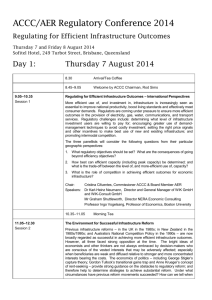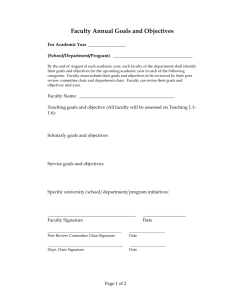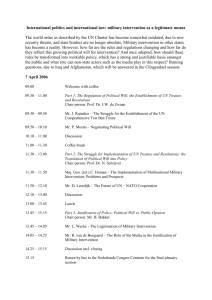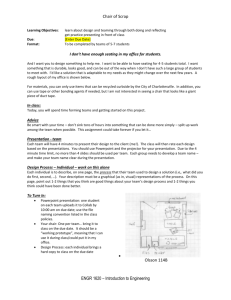doc - Australian Competition and Consumer Commission
advertisement
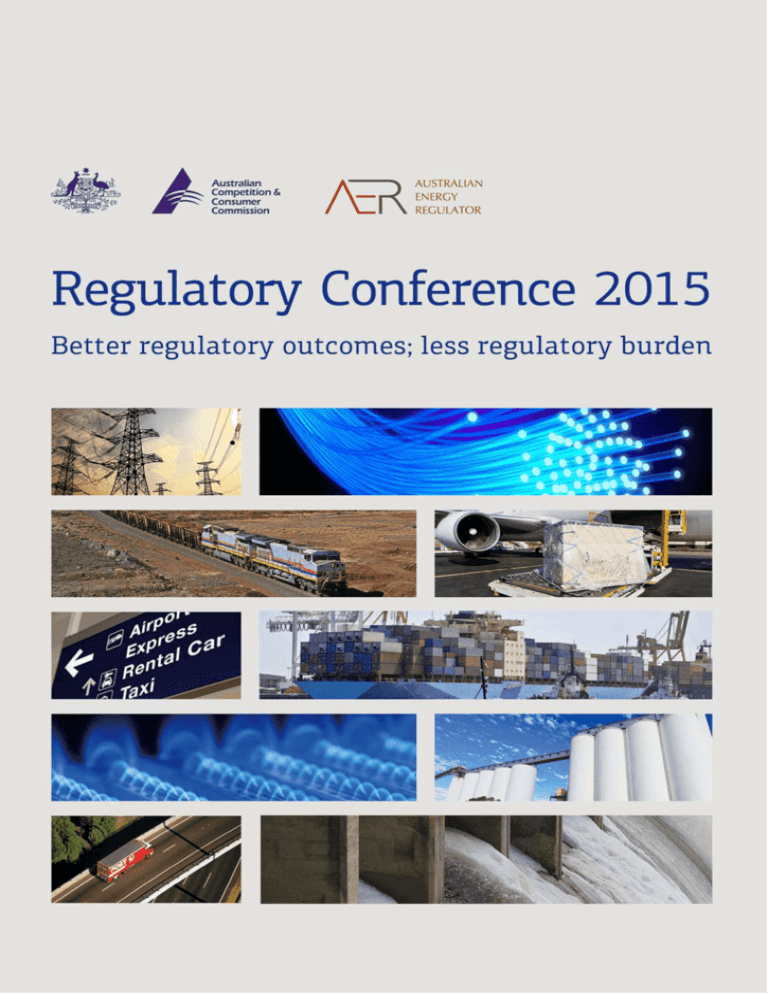
Day 1: Thursday 6 August 2015 8.30 Arrival, tea and coffee 8.45–9.05 Welcome by ACCC Chairman, Rod Sims 9.05–10.45 International update, perspectives and implications for Australia Plenary 1 What are the big issues in the world of infrastructure regulation? The three speakers in the opening plenary session will provide an update on the current issues relating to the economic regulation of infrastructure from a UK, European and US perspective. This will include a focus on the conference theme of approaches to achieving better regulatory outcomes while reducing regulatory burden. Chair: Cristina Cifuentes, Commissioner, ACCC and Board Member, AER Speakers: Professor Stephen Littlechild, University of Cambridge Professor Anna Creti, University Paris Dauphine Professor Tim Brennan, University of Maryland Baltimore County 10.45–11.15 Morning tea 11.15–12.40 Plenary 2 What constitutes good regulatory outcomes, and good regulator performance? The Australian regulatory frameworks all have at their core the overall objective of regulating for the long term interests of end-users. This can incorporate considering the effect of regulatory decisions on encouraging competition, achieving economic efficiency, promoting economy-wide productivity, and honouring the ‘regulatory contract’. It can also involve balancing what are at times competing objectives of providing appropriate returns to network owners and broader community expectations that prices should be fairly stable over time. How the performance of the regulator is judged can depend on which of the above objectives are considered most important. Is general confidence that the two key stakeholder groups—regulated businesses and consumers— are receiving relatively fair outcomes, sufficient? Or does a reasonable assessment rely on an understanding of the details of the regulatory framework? Chair: Sarah Court, Commissioner, ACCC Speaker: Mr Luigi Carbone, Board Member, Italian Regulatory Authority for Electricity, Gas and Water Discussant: Mr Rod Shogren, Member of the Australian Competition Tribunal 12.40–1.40 Lunch 1.40–3.05 A: The use of benchmarking in regulatory determinations Breakout 1 Many OECD countries have now used benchmarking as part of regulatory determinations for over 10 years. What have been the outcomes for the regulated businesses and end users? Has benchmarking reduced or increased the regulatory burden? What were some of the initial implementation issues, how were these addressed, and was this successful? Chair: Michelle Groves, CEO, AER Speakers: Professor Tooraj Jamasb, Durham University Dr Marcus Stronzik, Department Energy Markets and Energy Regulation, WIK 1.40–3.05 B: The trade-off between regulatory flexibility and certainty Breakout 1 Regulatory certainty is important for planning and investment decisions of infrastructure owners. However, if the regulatory framework prevents the regulator from adapting future decisions to prevailing conditions, the final outcome may not always be in the best interests of either infrastructure owners or end users. An appropriate balance must be found. The Vertigan Review of telecommunications regulation recommended changes to the operation of ‘fixed principles’ that are aimed at encouraging the regulator to be more willing to accept fixed principles, thereby promoting certainty. How did the Review assess the trade-off given the dynamic nature of the telecommunications market? How does the regulator deal with this trade-off during the decision making process? Has there been a reluctance to utilise mechanisms that promote certainty at the cost of flexibility? Chair: Michael Cosgrave, EGM, Infrastructure Regulation Division, ACCC Speakers: Professor Henry Ergas, University of Wollongong Mr Ed Willett, Tribunal Member, NSW IPART 3.05–3.35 Afternoon tea 3.35–5.00 Breakout 2 A: Extending Australia’s competition law to government activity in trade or commerce Since the 1990s, Australian governments have increasingly used market mechanisms for the delivery of utility services. The instrument (e.g. contract, licence) governs the operation of the utility. Although the government body is undertaking a commercial transaction, it is not carrying on a business. Should the government body be subject to Australia’s competition law? Chair: Dr Jill Walker, Commissioner, ACCC Speaker: Associate Professor Deborah Healey, Faculty of Law, University of NSW Discussants: Ms Linda Evans, Partner, Clayton Utz Mr David Blacktop, Principal Counsel—Competition, NZCC B: Net neutrality: lessons for Australia from the US experience The principle that all electronic communication passing through a network is treated equally has been a hot topic in communications regulation for years, culminating this year with the US Federal Communications Commission making new rules that would ban practices it says will harm the ‘Open Internet’. The rules—which ban blocking, throttling and paid prioritisation on mobile and fixed line networks—have been subject to intense debate and scrutiny. Opponents say they will ‘wreak havoc on the Internet economy’. What is the Open Internet? What US institutional factors determined why it looks the way it does? What are the claimed economics underpinning of the Order, and what are the economic critiques? What legal impediments does the Order face? Finally, are the core policy issues economics and competition, or are they driven implicitly by broader social concerns? Chair: Sean Riordan, GM, Infrastructure Regulation Division, ACCC Speaker: Professor Tim Brennan, University of Maryland Baltimore County Discussant: Mr Warwick Davis, Frontier Economics 6.30–10.30 Conference dinner Speaker: Mr John Fraser, Secretary of the Treasury Day 2: Friday 7 August 2015 8.30 Arrival, tea and coffee 8.45–10.15 Electricity network businesses—extending the services provided by the ‘poles and wires’ Plenary 3 Significant changes to the operating environment of electricity network businesses mean that they are being called upon to develop a more interactive relationship with other market participants—system operators, retailers and particularly end-users. Technological change is also creating opportunities to provide new services within the ‘grey’ zone between the regulated monopoly space and the contestable services space. What are the opportunities and risks for network businesses and other market participants? How can the regulator, operating within the existing regulatory framework, facilitate network businesses achieving better outcomes for themselves and consumers? Are there implications for the broader regulatory framework? Chair: Paula Conboy, Chair, AER Speaker: Professor Tooraj Jamasb, Durham University Discussants: Professor Anna Creti, University Paris Dauphine Mr Timothy Rourke, CEO, CitiPower and Powercor Australia 10.15–10.45 Morning tea 10.45–12.00 Consumer engagement and negotiated outcomes in the UK water sector—time to redefine the regulator’s role? Plenary 4 Since at least 2011, UK water regulators have made particular efforts to encourage negotiated settlements and customer engagement to drive better outcomes and reduce the burden of government intervention through regulation. In 2014, Ofwat put these approaches into practice. What are the early impacts of these measures for price and service outcomes; and for regulatory processes? What lessons can we learn from the UK water experience and how might they be applied in Australia? Chair: James Cox, Board Member, AER Speaker: Mr Giles Stevens, Director, Markets & Economics, Ofwat Discussant: Professor Stephen Littlechild, University of Cambridge 12.00–1.00 The great regulatory debate Closing plenary Six of the conference speakers/delegates will debate the merits of regulating to address an important social issue Conference review and closing Mr Rod Shogren, Member of the Australian Competition Tribunal 1.00–2.00 Lunch
